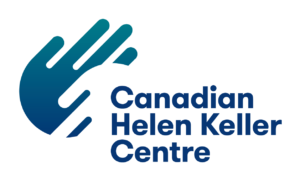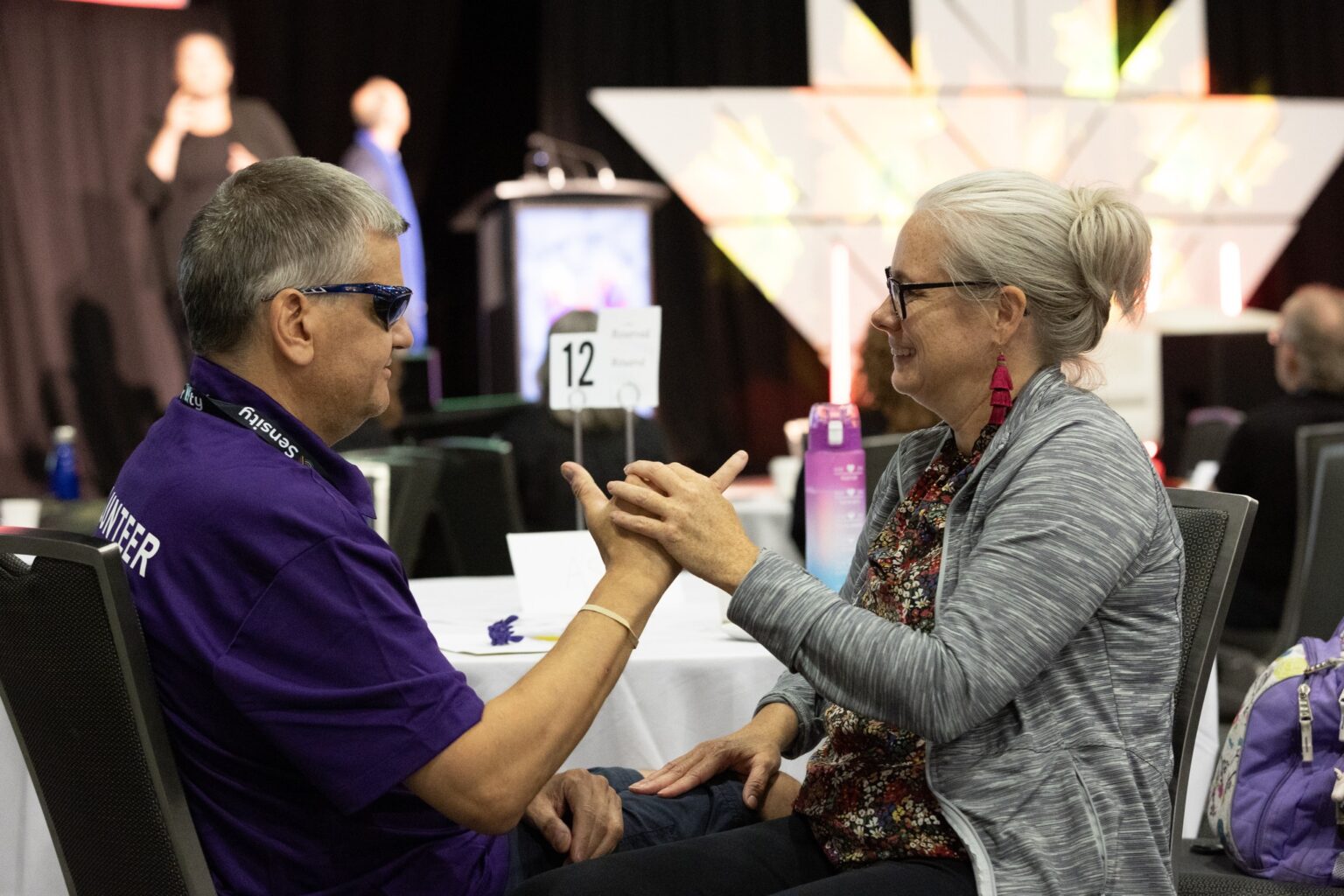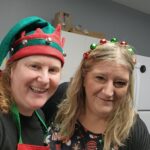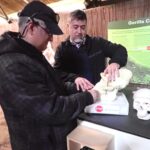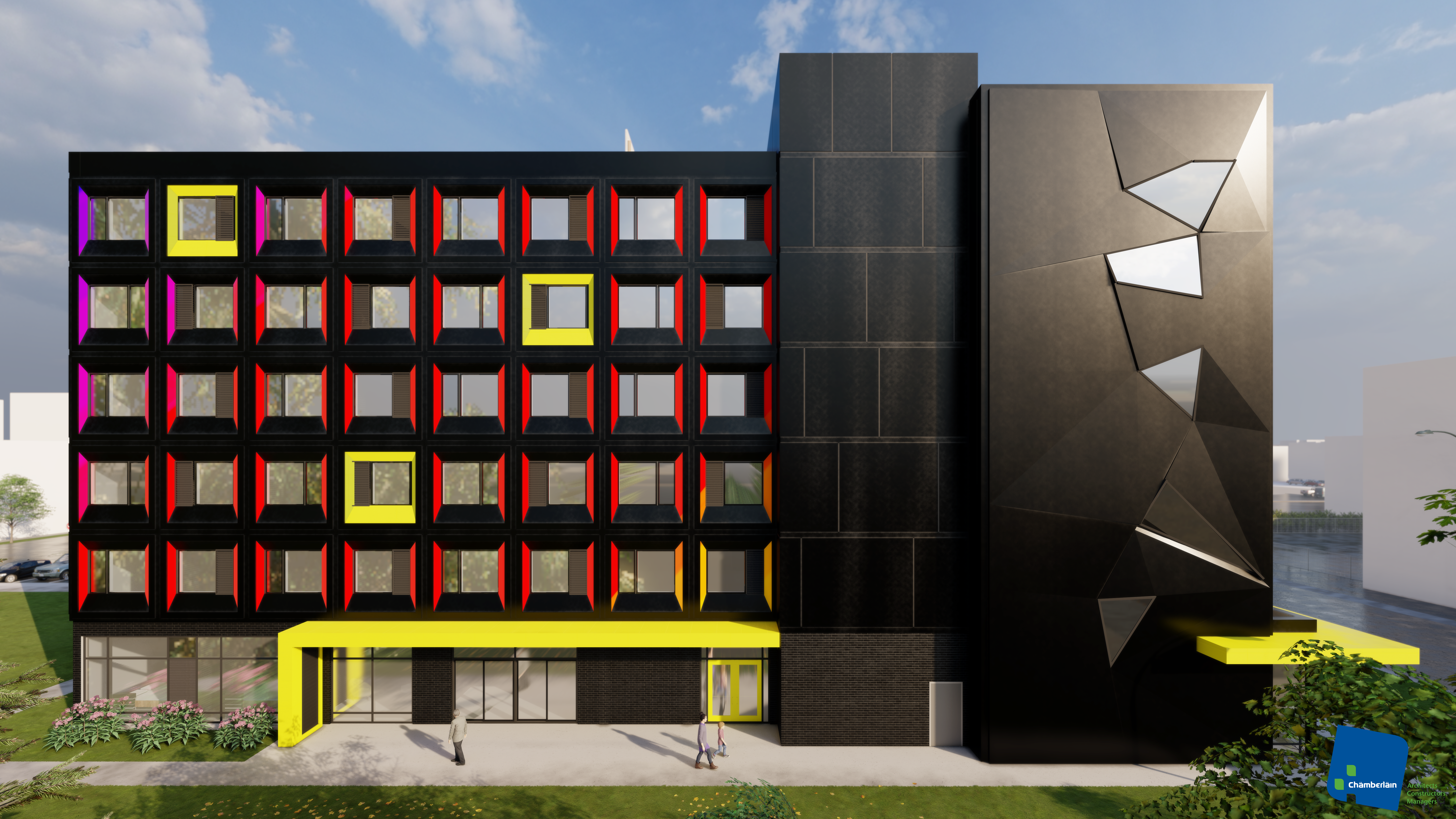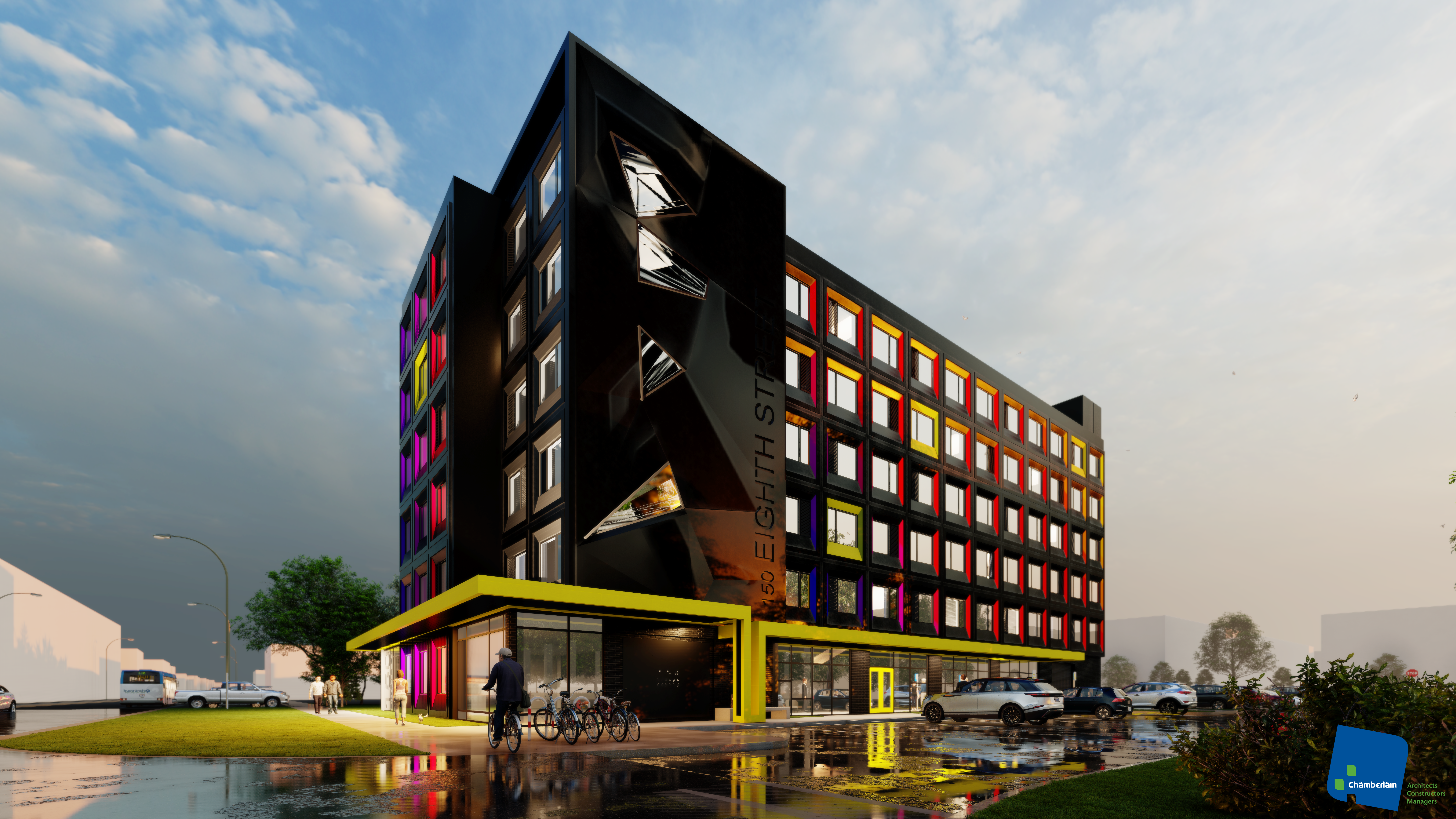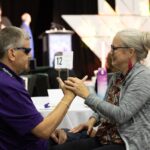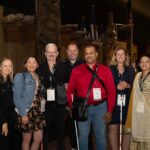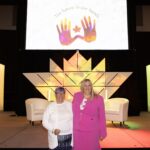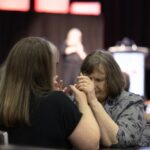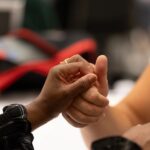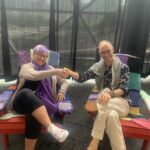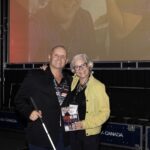NDBAM Events
For National Deafblind Awareness Month (NDBAM) this June 2024 we are excited to announce the following:
CN Tower Lighting – June 1 @ dusk.
2nd Annual CHKC Fundraiser at Steam Whistle Brewing – June 4 from 6:00 p.m. to 10:00 p.m.
Blue Jays Game & CHKC Awareness Day – June 6 @ 1:07 p.m.
Past Event Photos
Did you get snapped at some of our latest events? Check out the photos below and also our social media channels to see if you can spot yourself!
- A mix of consumers and staff pose for the camera in front of Christmas presents at the CHKC Training Centre.
- Consumer Lee Ann and IV Lisa-Marie bake at CHKC’s Training Centre.
- From left to right: Danny, Dave, Thomas at the Christmas staff party.
- Kaye and Jen pose for the camera at the CHKC Training Centre.
- IV Max and consumer Gino touch a faux skull at the museum.
- Wilfred petting a dog at CHKC’s RCA.
The Urgent Need for Affordable Housing for Canadians Who Are Deafblind

Adrian smiles for the camera at The Ex in downtown Toronto.
When Canadian Helen Keller Centre (CHKC) opened its doors in 1992 its goal was to provide affordable and accessible housing for Canadians who are deafblind.
But with only 16-units available it was impossible to serve all of the 400,000 Canadians who have dual sensory loss; individuals who are both legally deaf and legally blind.
Since those first days CHKC has grown exponentially to provide additional programs and services to the 16 tenants who live at 422 Willowdale Ave. as well as the 18 outreach consumers who live in the province of Ontario.
In addition to housing, CHKC also provides intervenor services to individuals who are deafblind to maximize their independence. This allows consumers to access their communities more independently.
But housing continues to be a focus of CHKC’s mission and vision, as it looks towards a brighter future where people who are deafblind can live just as securely as those who are more able-bodied.
In 2022 CHKC secured Federal funding through the Rapid Housing Initiative to build a state-of-the-art 56-unit housing complex in the Lakeshore-Etobicoke neighborhood of Toronto located at 150 Eighth Street. The goal is to provide even more affordable and accessible housing to the deaflblind population.
To people like Adrian Cosentino who, as a person who is deafblind since birth, has struggled with finding affordable housing his whole life.
“Through intervenor services Adrian is able to live as independently as possible,” says Lessette Morales, Consumer Support Specialist at CHKC. “But the lack of affordable and accessible housing for people who are deafblind means that Adrian is vulnerable to homelessness. That’s why we’re here, to support him through the intricacies of Toronto housing. There is still more work for us to do and we are committed to succeeding for Canadians who are deafblind.”
Providing an opportunity for individuals like Adrian did not previously exist, but this new initiative has opened many doors for those who live with dual sensory loss and who can benefit from affordable and accessible accommodations.
“I’m looking forward to applying to live at 150 Eighth Street,” says Adrian. It’s something that I’ve been waiting a long time for.”
To apply to live at CHKC, visit our website at chkc.org and click the ‘Housing’ tab located on the top menu bar.
Lessette continues, “With additional housing we can ensure that people like Adrian can live more independently and safely. People who are deafblind are vulnerable members of our community
and providing our consumers with adequate housing is one of our top priorities. This new funding will allow us to meet more people’s needs and that is something Ontarians should be proud of.”
Individuals who are deafblind, like Adrian, deserve the right to live independently, and CHKC is dedicated more than ever to making that possible.
To apply to live at CHKC, visit our website at chkc.org and click the ‘Housing’ tab located on the top menu bar.
Creating Independence for the Deafblind Community More Housing, More Independence
- Rendering of the new building at 150 Eighth Street.
- Rendering of the new building at 150 Eighth Street.
- Rendering of the new building at 150 Eighth Street.
CHKC is a remarkable success story. It provides accessible housing, programming and intervenor services for people who are deafblind. This helps alleviate the severe isolation that people with deafblindness can experience without specialized services, adaptive communication methods and appropriate housing.
“CHKC is unique because we have a 16- unit affordable housing building where deafblind consumers live independently in their own apartments,” says Jennifer Robbins, Executive Director of CHKC. “For over 30 years, these residents have received support from intervenors, who became the eyes and ears of people with vision and hearing loss. We also offer intervenor support to deafblind consumers living in the community.”
Over 400,000 Canadians are deafblind, each with individual needs that require special attention. Intervenors exist for communication and to create independence. They help consumers take part in the same types of day-to-day activities that any individual may choose to participate in. This can include dining at a restaurant, attending an exercise class, going to a doctor’s appointment or grocery shopping. Additionally, intervenors help deafblind people to socialize and create closer relationships with family and friends.
CHKC is currently embarking on its most ambitious project to date. Under the leadership of CHKC Board Chair Philip Corke and CHKC Director Anupam Kothari, the organization is building a 56-unit affordable and accessible apartment building. The new housing development will help reduce CHKC’s waitlist and give more people with a combination of hearing and vision loss access to an independent life. People with other disabilities will use any remaining units.
“Being independent is important for a person’s mental health and overall wellbeing,” says Robbins. “It also helps people who are deafblind to be fully immersed within the community and society at large.”
CHKC’s new apartment complex will also have a 6,500 sq. ft. state-of-the-art training centre where deafblind people can learn essential life skills to aid in their independence. This includes communication systems such as American Sign Language (ASL) and tactile ASL to braille and print-on-palm. There will be training in home management skills such as cleaning, laundry, and home safety, organization and maintenance. Consumers can learn about cooking, safe food handling/storage, personal grooming (e.g., shaving, putting on make-up), money management (e.g., budgeting, online banking) and technology (e.g., general computer skills, Apple and Android devices, deafblind-friendly apps). As well, CHKC offers social programs that evolve around
sharing meals, gardening and other peer group activities.
“Accessibility is an important part of creating inclusive and welcoming communities,” says Robbins. “As an experienced housing provider for Canadians who are deafblind, we know what is needed to create independence and community under the same roof. Our entire team, which includes members of the deafblind community and independent committee members, is working passionately to help more people with dual sensory loss access an independent life. We are incredibly proud of the work that has been accomplished. CHKC is also eternally grateful for the financial support to fund our growth and help make this new apartment building a reality.”
So far, CHKC has secured $32 million of the $38 million needed to complete the project. The organization’s goal is to raise the remaining $6 million from generous donors and sponsors.
Please contact info@chkc.org for information regarding available sponsorship opportunities. Or visit our microsite at 150eighthstreet.ca or our Ways To Give page on the CHKC website.
Article written by Christine Payne.

Canada Proudly Hosted the World in July 2023
- Elio Riggillo from CHKC communicates with an unidentified woman through hand-over-hand ASL.
- A photograph from above of the opening night at the Canadian Museum of History. The picture shows a crowd of people socializing.
- To the left is a female consumer and to the right is her female intervenor. They are communicating via hand-over-hand ASL.
- A group of seven conference attendees pose for a picture.
- To the left is Cathy Proll, CEO of Sensity and standing next to her is Jennifer Robbins, Executive Director, CHKC. They stand to in front of the main podium at the Shaw Centre in Ottawa, Canada.
- To the left is a female intervenor communicating via hand-over-hand ASL with a female consumer who sits at the right of the photo.
- To the left of the photo is a female intervenor communicating via ASL to an unidentified man in a ball cap whose back is to the camera.
- A picture of hand-over-hand ASL communication.
- Sensity CEO Cathy Proll sits with Baur Mirko from Swiss Foundation for Persons with Deafblindness who will host the next international conference in Zurich, Switzerland.
- Author of Deafblind Champion, Kevin Frost poses with his book with CanPlan conference planner, Bettyanne Sherrer.
Canada proudly hosted the 18th International World Conference in our nation’s capital, Ottawa, this past July 2023.
With the theme Global Connections: The Future in Our Hands, this mammoth event, which brought together over 500 members of the international deafblind community was a tremendous success.
CHKC was front and centre throughout the week-long conference and took a leadership role, paving the way in spreading awareness about deafblindness and our programs and services.
We had many staff members and consumers lead plenary and breakout sessions about various topics that impact our community not only in Canada, but internationally.
Canada demonstrated a keen knowledge of accessibility requirements for those living with dual sensory loss from inception to the conclusion of the five-day event.
We couldn’t have been prouder of the multiple planning committees who worked tirelessly over the last four years to bring this conference together, especially during a time when they were working through a pandemic.
The next international conference is set to take place in 2027 in Zurich, Switzerland. Stay tuned for more details.
For more information, visit deafblindnetworkontario.com.
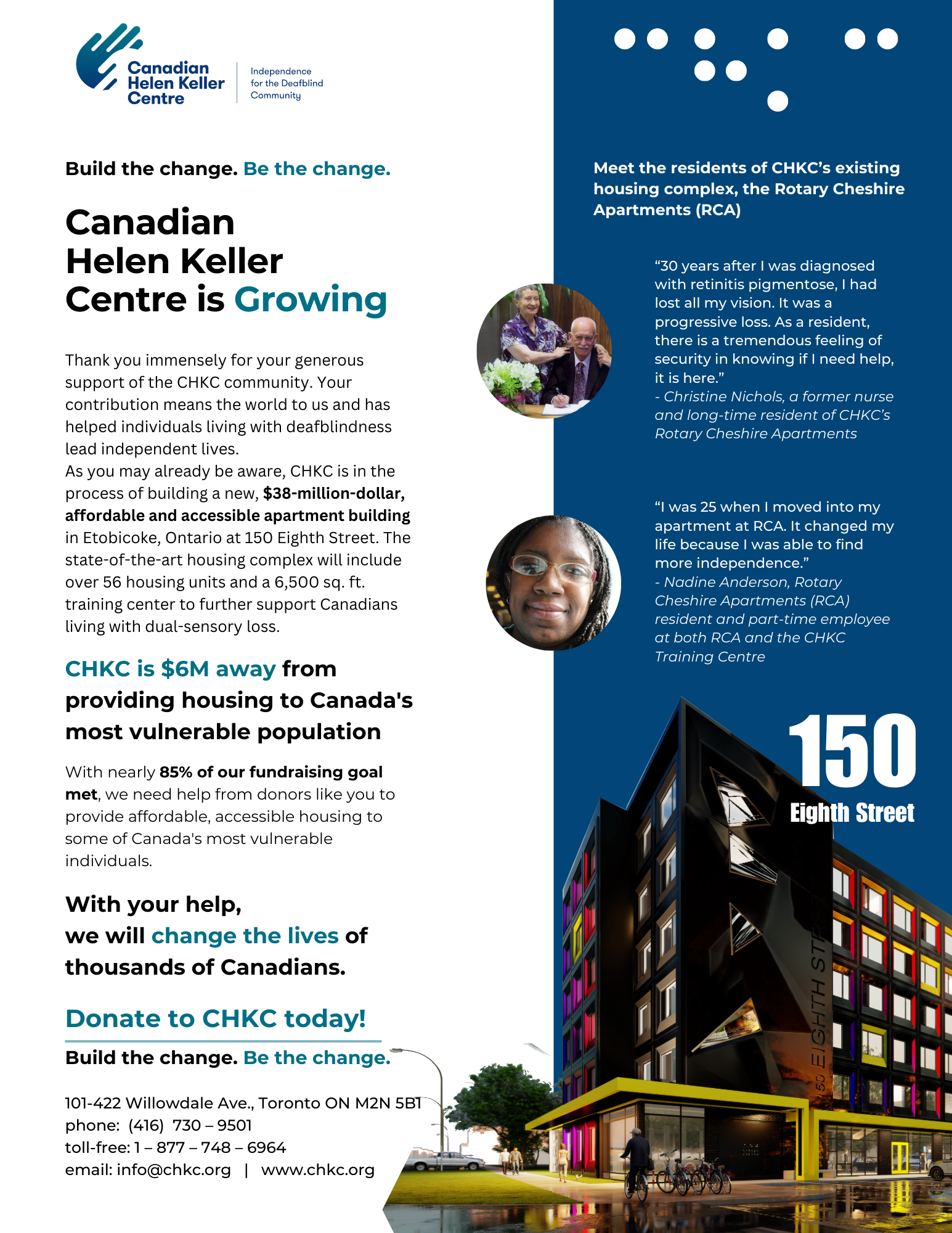
Click here for PDF version.
